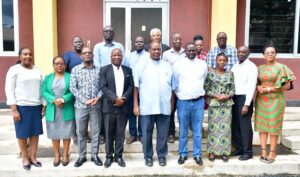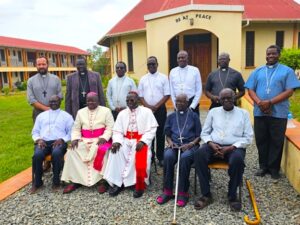UGANDA: CARITAS seeks to improve status of Persons with Disabilities in Uganda

In an effort to promote the full integration of persons with Disabilities (PWDs) in the society, employees and staff of Caritas Uganda will participate in a Disability-Inclusive Development (DID) Training Workshop planned to take place from 25th, – 27th, April, 2018 in Kisubi, Uganda.
The three-day training will be held under the theme “Get up, Pick up your Mat and Go” (confer Mathew 2:1-12). Over 50 participants are expected to take part, including National Caritas Uganda staff, Diocesan Caritas Programme and Advocacy Managers from all the 19 Dioceses in the country. Other representatives from the national and local governments are also to be in attendance.
In a recent interview with the Research and Policy Coordinator of Caritas Uganda, Godfrey Onentho, the underlying assumption for this training is that whereas there seem to be widespread awareness about the “Preferential option for poor principle”, not much has been done by Caritas to adopt disabilities responsive programming and advocacy. The proposed training, therefore, seeks to bring this category of vulnerable persons at the fore in Caritas programming and advocacy processes.
“This is unlike gender mainstreaming and programming that seems to receive widespread attention within Caritas programmes at both diocesan and national levels. Yet, PWDs can easily be categorized among the most vulnerable owing to their physical conditions and social marginalization,” said the Research and Policy Coordinator of Caritas Uganda.
The training will run concurrently with a study commissioned by Caritas Uganda to identify key disabilities issues and current responses in at least eight of the 19 dioceses, and best practices and challenges within Caritas work in this area.
The participants are expected to review on Caritas’s current projects focusing on persons with disabilities, focusing on how the project can be made even more inclusive; as well as reflections on how participants can apply the learned principles in their everyday practice of their respective professions. All diocesan and national Caritas staff are also expected to immediately adopt disabilities-sensitive programming in their respective Dioceses after the training.
The World Health Organization estimates 10% of the world’s population to be disabled. According to the Uganda’s National Census report of 2002, 4 out of every 25 persons in Uganda have disabilities, thus making it a development concern. Persons with disabilities are more likely to experience adverse socioeconomic outcomes than persons without disabilities, such as less education, poorer health outcomes, lower levels of employment, and higher poverty rates.
According to the National Population and housing Sector 2014 Report, overall for population aged two years and above, the disability prevalence rate was 12.4% while the equivalent for five years and above was close to 14%.
Gender differentials revealed that disability is higher among women compared to men. It also showed that the disability prevalence rate was higher among those living in the rural areas compared to those in the urban areas. Some of the common disabilities in Uganda include visual and hearing impairment, physical and multiple disabilities, mental and psycho-socio disabilities as well as intellectual disabilities and albinism.
By Jacinta W. Odongo; Media Officer, UEC


